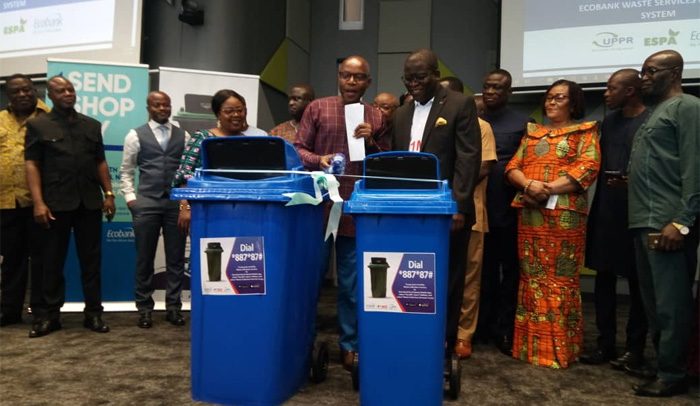A private sector led one million waste bins project has been launched.
The project is a partnership between Universal Plastic Products and Recycling (UPPR) Ghana, Ecobank Ghana Limited, and the Environmental Services Providers Association (ESPA).
Ecobank Ghana Limited has committed over $10 million as a medium-term loan facility to support the production of the waste bins.
Launched on Tuesday at Ecobank’s headquarters in Accra, the project aims at facilitating the supply of one million waste bins to households and businesses in all communities across Ghana.
The aim, is to reduce indiscriminate littering and promote good health across all communities in Ghana.
Speaking at the launch, Managing Director of Ecobank Ghana, Dan Sackey, indicated that his outfit entered the partnership to help create awareness about environmental cleanliness among Ghanaians.
He stated that the bank’s decision to join the partnership was also aimed at encouraging heavy usage of waste bins in every home in Ghana and as well promote recycling of waste.
According to him, Ecobank committed the over $10 million “in the hope that the one million waste bins being distributed across the country will go a long way to promote environmental best practices, good health and general wellbeing.”
He stated also that Ecobank Ghana was relying on the partnership to provide a variety of payment solutions to the numerous patrons of waste management service providers and to propel Ghana towards the much-desired cash lite economy status, while keeping the country clean.
The waste bins are being produced by UPPR Ghana Limited, a subsidiary of the Jospong Group of Companies.
The bins are fitted with Radio Frequency Identity (RFID) tags that enables waste management companies to closely monitor and effectively oversee the operations of their workers on field.
President of ESPA and Chairman of Jospong Group of Companies, Dr. Joseph Siaw-Agyapong, lamented that the absence of waste bins in various households, workplaces, lorry parks and other public places, has been the major reason for indiscriminate littering in communities, something he believes poses a lot of danger to lives and properties in communities.
“We therefore embarked on this project with the sole aim of negating this situation and keeping our environment clean,” he said.
He added that “this is a nationwide social intervention project aimed at helping improve the lives of people by correcting poor sanitation practices and improving solid waste collection service delivery in Ghana.”
To ensure the success of the project, uniformed officials of waste management companies, with ID cards, will move into communities for the purposes of registration and distribution of waste bins.
The project has received the full support of Government.
BY Melvin Tarlue


